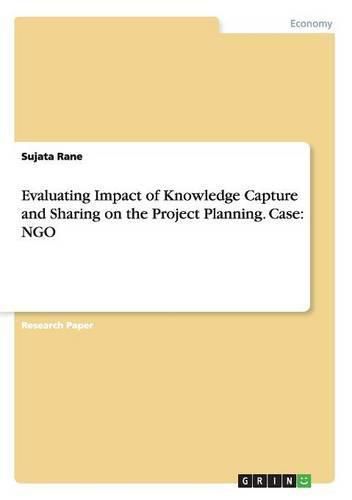Readings Newsletter
Become a Readings Member to make your shopping experience even easier.
Sign in or sign up for free!
You’re not far away from qualifying for FREE standard shipping within Australia
You’ve qualified for FREE standard shipping within Australia
The cart is loading…






Research Paper (postgraduate) from the year 2014 in the subject Business economics - Business Management, Corporate Governance, grade: B+, University of Leicester, course: MBA Information management, language: English, abstract: The objective of the research is to find if there is any impact of knowledge capture and sharing on the project planning at Practical Action (Kenya). Knowledge capture and sharing are two important components of knowledge management. Knowledge management has many definitions and some of these are listed in the appendix. Knowledge capture is one of the elements of knowledge management where the knowledge from the organization or from outside the organization is encapsulated in processes, tools or within the organizational resources to make it available to the rest of the organization. The knowledge sharing can happen when knowledge is captured successfully. Knowledge sharing is used to make sure that encapsulated knowledge is made available, shared, circulated or dispersed to be available at the right time to the right people. However, the attention deserved by knowledge capture and sharing in the development organizations is quite less. There are multiple reasons for this phenomenon. The one of the prominent reason is that ‘knowledge’ is not visible. Its intangible, it cannot be directly observed therefore, many organizations do not accept the importance of knowledge easily. The research subject has originated from the fact that knowledge capture and sharing has strong theoretical presence however, practical implications of it and swiftness in organizational decisions making regarding knowledge management lack noticeably. Project management is more adapted science. Whereas, knowledge management is more spoken, written than practiced. Therefore, in the author’s view it will be useful to find a relationship of knowledge management with established discipline such as project management. Project management is undoubtedly backed by the literature
$9.00 standard shipping within Australia
FREE standard shipping within Australia for orders over $100.00
Express & International shipping calculated at checkout
Research Paper (postgraduate) from the year 2014 in the subject Business economics - Business Management, Corporate Governance, grade: B+, University of Leicester, course: MBA Information management, language: English, abstract: The objective of the research is to find if there is any impact of knowledge capture and sharing on the project planning at Practical Action (Kenya). Knowledge capture and sharing are two important components of knowledge management. Knowledge management has many definitions and some of these are listed in the appendix. Knowledge capture is one of the elements of knowledge management where the knowledge from the organization or from outside the organization is encapsulated in processes, tools or within the organizational resources to make it available to the rest of the organization. The knowledge sharing can happen when knowledge is captured successfully. Knowledge sharing is used to make sure that encapsulated knowledge is made available, shared, circulated or dispersed to be available at the right time to the right people. However, the attention deserved by knowledge capture and sharing in the development organizations is quite less. There are multiple reasons for this phenomenon. The one of the prominent reason is that ‘knowledge’ is not visible. Its intangible, it cannot be directly observed therefore, many organizations do not accept the importance of knowledge easily. The research subject has originated from the fact that knowledge capture and sharing has strong theoretical presence however, practical implications of it and swiftness in organizational decisions making regarding knowledge management lack noticeably. Project management is more adapted science. Whereas, knowledge management is more spoken, written than practiced. Therefore, in the author’s view it will be useful to find a relationship of knowledge management with established discipline such as project management. Project management is undoubtedly backed by the literature